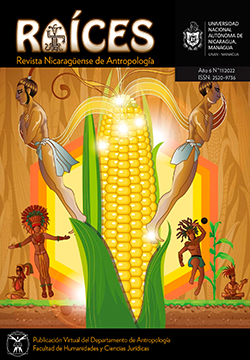Rurality envilo: Jesús Tepactepec persistences and Socio-labor transformations
DOI:
https://doi.org/10.5377/raices.v6i11.14504Keywords:
Culture, Globalization, Pluriactivity, New Rurality andRural SubjectAbstract
This research is immersed in the analysis of contemporary dynamics that generate the processes of reconfi guration of rurality in a territorial sense, the relationship of the community with the environment or environment and its effects on the rural culture, based on the resignifi cation assigned by rural families in Jesús Tepactepec. Among the purposes is the purpose of deepen the way in which the territory is taken, from the physical, to the symbolic confi guration in the inhabitants and the influence on the reproduction of the rural way of life, for this, it is investigated in the transformations within rural territory and in the reproduction of the culture of the settlers, which allows an exploration in the relations between society and nature and human beings and environment, through the ways in which the population perceives, coexists and confronts pollution of the Zahuapan River, by the present dynamics of activities industrial and its effect on the concentration of populations.
Downloads
References
Bateson, G. (1990 [1979]) “Espíritu y Naturaleza”. Buenos Aires: Amorrortu Editores.
Biersack, A. (2006). “Reimagining political ecology: culture, power, history, nature”. En Reimagining political ecology, Biersack & Greenberg (ed): pp. 03-40. Durham: Duke University Press.
Boserup, E. (1967). Los determinantes del desarrollo en la agricultura. Madrid: Editorial Tecnos. Cardoso de Oliveira, R. (1998). O trabalho do antropólogo. Sao Paulo: UNESP.
Chayanov, A. V. (1974). Teoría de la Economía Campesina. Organización de la Unidad Económica Campesina. Buenos Aires: Nueva Visión.
Di Filippo, J. (2003). La sociedad como representación. Paradigmas intelectuales del Siglo XIX. Buenos Aires: Editores Siglo Veintiuno.
Ellis, F. (1993). Peasant economics: farm households and agrarian development”. Cambridge: Cambridge University Press.
Folchi M. (2001). “Confl ictos de contenido ambiental y ecologismo de los pobres: no siempre pobres, ni siempre ecologistas”. Ecología Política, n. 22, pp. 79-99.
Guha, R. (1994). “El ecologismo de los pobres”. Ecología Política, n. 8, pp. 137-151.
Haesbaert R. (2013). “Del mito de la desterritorialización a la multiterritorialidad”. Cultura y Representaciones Sociales, año 8, n. 15, pp. 9-42.
Harris, M. (2005). “Vacas, cerdos, guerras, y brujas: los enigmas de la cultura”. Madrid: Alianza Editorial.
Harvey, D. (2003). El nuevo imperialismo. Madrid: AKAL.
Hinojosa O. J. (1983). El ejido en México, análisis jurídico. Centro de Estudios Históricos del Agrarismo en México. México: Editorial (CEHAM).
Ingold, T. (2000). The Perception of the Environment. Essays on livelihood, dwelling and skill. Londres y Nueva York.: Routledge.
Lefevre, H. (1976). Espacio y Política. Barcelona: Ediciones Península.
Llambí, L. y Duarte, M. (2006). “Procesos de Crecimiento Endógeno y Desarrollo Territorial Rural en América Latina: Enfoques teóricos y propuestas de política”, Revista ALASRU, Nueva Época. Análisis latinoamericano del medio rural. N° 3. pp. 223-250.
Márquez F. (2011). “De territorios, fronteras y ciudadanías urbanas por una etnografía translocal La Chimba, Santiago de Chile”. Chungara, Revista de Antropología Chilena, Volumen 45, n. 2, pp. 321-332.
Martínez A. (2004). El ecologismo de los pobres. Confl ictos ambientales y lenguajes de valoración. Barcelona: Icaria.
Martínez, L. (2000). Economías Rurales: Actividades No-Agrícolas. Quito: Centro Andino de Acción Popular (CAAP).
Mazurek H. (2006). Espacio y Territorio. Instrumentos metodológicos de investigación social. La Paz: IRDPIEB/U-PIEB.
Morett J. (1990). Alternativas de modernización del ejido. Instituto de Proposiciones Estratégicas. México: Editorial Diana.
Nazarea, Virginia (2006). Ethnoecology as Situated KnowledgeHaenn. En A View from a Point: The Environment in Anthropology: a reader in ecology, culture and sustainable living, Nora y Richard R. Wilk (eds.): pp. 34-39. New York: New York University Press.
Ramos J. (1998). “Una estrategia de Desarrollo a partir de los Complejo Productivos (Clusters). Entorno a los recursos naturales ¿Una estrategia prometedora?” CEPAL, n.66, pp. 105-125.
Redfield, R. (2002 [1961]) “Campesinado: Sociedades Parciales”. En Antropología sin Fronteras. Robert Redfi eld, Ana Bella Pérez Castro, María Guadalupe Ochoa Ávila, y María de la Paz Soriano Pérez (eds.): pp. 173-185. México, D. F.: UNAM-IIA.
Renard, M.C. (1999). Los intersticios de la globalización: un label (Max Havelard) para los pequeños productores de café. México: Universidad Autónoma de Chapingo.
Salas, H. y Rivermar, M. (2011). “Nuevas Ruralidades el Sur de Tlaxcala”. En Nuevas Ruralidades. Expresiones de la transformación social en México, Hernán Salas, Ma. Leticia Rivermar y Paola Velasco (eds.): pp. 139-163. México D.F.: Universidad Nacional Autónoma de México. Instituto de Investigaciones Antropológicas y Juan Pablos. S.A.
San Martín, R. (2003). Observar, escuchar, comparar, escribir. Barcelona: Ariel Antropología. Sánchez Parga, José (2010). El Ofi cio de Antropólogo. Quito: Ed. Abya Yala.
Santamaría Campos, Beatriz (2008). “Antropología y Medio Ambiente. Revisión de una tradición y nuevas perspectivas de análisis en la problemática ecológica”. Revista de Antropología Iberoamericana, vol. 3, n. 12, pp. 144-184.
Shields, R. (2009). “Henri Lefebvre: La Production de L’espace”. Estudios Urbanos y Regionales, n. 63, pp.7-17.
Toledo, V. (1992). “La racionalidad ecológica de la producción campesina”. Revista CLADES. Agroecología y Desarrollo. N° 5. Disponible en http://www.clades.cl/revistas/5/rev5art3.htm
Walter, M. (2009). “Confl ictos ambientales, socioambientales, ecológico distributivos, de contenido ambiental. Refl exionando sobre enfoques y defi niciones”. CIP-Ecosocial. Boletín ECOS, n. 6, pp. 1-9.
Downloads
Published
How to Cite
Issue
Section
License
Copyright (c) 2022 © Universidad Nacional Autónoma de Nicaragua, Managua, UNAN-Managua

This work is licensed under a Creative Commons Attribution-NonCommercial-ShareAlike 4.0 International License.




